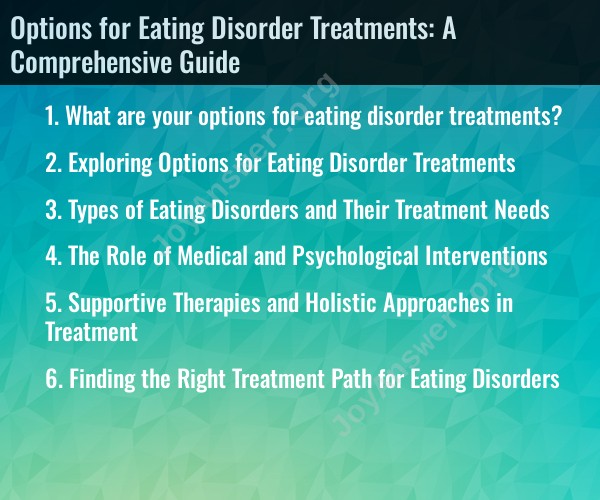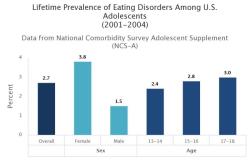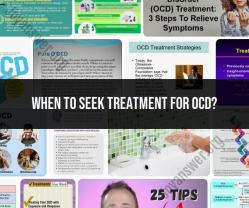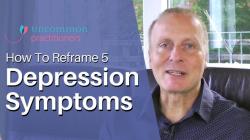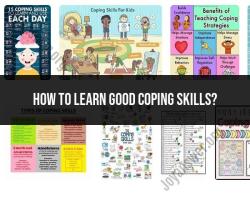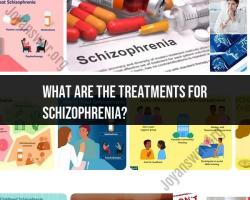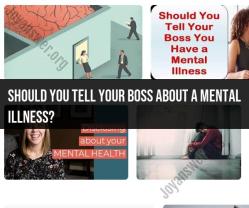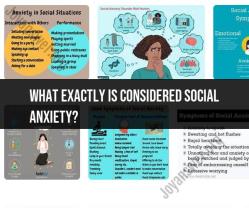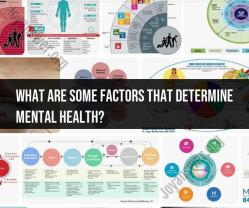What are your options for eating disorder treatments?
Eating disorders are complex mental health conditions that require specialized treatment. The choice of treatment depends on the type and severity of the eating disorder, as well as individual factors. Here is a comprehensive guide to the options for eating disorder treatments:
Psychotherapy:
- Cognitive-Behavioral Therapy (CBT): CBT is one of the most common and effective treatments for eating disorders. It focuses on identifying and changing distorted thought patterns and behaviors related to food and body image.
- Dialectical-Behavior Therapy (DBT): DBT is useful for individuals with eating disorders who also struggle with emotional dysregulation. It combines CBT techniques with mindfulness and acceptance strategies.
- Interpersonal Therapy (IPT): IPT addresses interpersonal issues and relationships that may contribute to eating disorders. It helps individuals improve communication and relationship skills.
- Family-Based Treatment (FBT): FBT, also known as the Maudsley method, is often used for adolescents with eating disorders. It involves the whole family in the treatment process.
Medical and Nutritional Support:
- Medical Monitoring: In severe cases, individuals may require hospitalization or intensive medical supervision to address physical complications.
- Nutritional Counseling: Registered dietitians with expertise in eating disorders can provide education and guidance on healthy eating habits and meal planning.
Medication:
- Medication may be prescribed in some cases, particularly for conditions like bulimia nervosa and binge-eating disorder. Medications may include antidepressants, antipsychotics, or anti-anxiety drugs.
Inpatient and Residential Treatment:
- For severe or life-threatening eating disorders, inpatient or residential treatment in specialized facilities may be necessary. These programs provide 24/7 care and support for individuals struggling with eating disorders.
Partial Hospitalization or Intensive Outpatient Programs:
- These programs offer structured, daily treatment and support while allowing individuals to return home in the evenings. They can be effective for individuals who require more than outpatient care but don't need full inpatient treatment.
Support Groups:
- Peer-led or professionally facilitated support groups can provide a sense of community and understanding for individuals with eating disorders. They may complement other forms of treatment.
Mindfulness and Yoga:
- Mindfulness practices and yoga can help individuals become more in tune with their bodies and emotions. These techniques can be part of a holistic treatment plan.
Self-Help Books and Online Resources:
- Many self-help books and online resources are available that provide information, coping strategies, and support for individuals who may not be ready for formal treatment.
Recovery Coaching:
- Recovery coaches, often individuals with lived experience, can provide one-on-one support, guidance, and accountability throughout the recovery journey.
Complementary Therapies:
- Therapies like art therapy, music therapy, and equine therapy can be integrated into treatment plans to address emotional and psychological aspects of eating disorders.
Transitional Programs:
- After completing an intensive treatment program, individuals may benefit from transitional programs that provide continued support as they reintegrate into daily life.
Prevention and Education:
- Early intervention and education about eating disorders can help prevent them or address them in their early stages.
Choosing the right treatment for an eating disorder depends on a thorough evaluation by a qualified healthcare professional, considering the individual's unique needs, circumstances, and the type and severity of the eating disorder. Treatment plans are often tailored to address physical, emotional, and behavioral aspects of these conditions and may involve a combination of the options mentioned above. It's crucial to seek help as early as possible if you or someone you know is struggling with an eating disorder, as early intervention can improve the chances of recovery.
Exploring Options for Eating Disorder Treatments
Eating disorders are serious mental illnesses that can have devastating consequences for physical and emotional health. Fortunately, there are a variety of effective treatments available.
Types of Eating Disorders and Their Treatment Needs
The most common types of eating disorders are anorexia nervosa, bulimia nervosa, and binge-eating disorder. Each type of eating disorder has its own unique symptoms and challenges, and therefore requires its own specific treatment approach.
Anorexia nervosa is characterized by an intense fear of gaining weight and a distorted body image. People with anorexia often restrict their food intake severely, even to the point of starvation.
Bulimia nervosa is characterized by binge eating followed by purging behaviors, such as vomiting, excessive exercise, or laxative abuse. People with bulimia often have a normal or even overweight BMI, but they are still deeply unhappy with their bodies.
Binge-eating disorder is characterized by recurrent episodes of binge eating, which is defined as eating an abnormally large amount of food in a short period of time, often with a feeling of loss of control. People with binge-eating disorder may be overweight or obese, but they may also have a normal BMI.
The Role of Medical and Psychological Interventions
Treatment for eating disorders typically involves a combination of medical and psychological interventions.
Medical interventions may be necessary to address the physical health consequences of malnutrition and other eating disorder-related problems. For example, people with anorexia may need to be hospitalized to gain weight safely and to be monitored for medical complications.
Psychological interventions are essential for helping people to understand and address the underlying causes of their eating disorder. Common types of therapy for eating disorders include cognitive-behavioral therapy (CBT), family-based therapy (FBT), and interpersonal psychotherapy (IPT).
Supportive Therapies and Holistic Approaches in Treatment
In addition to medical and psychological interventions, a variety of supportive therapies and holistic approaches can be helpful for people with eating disorders. These may include:
- Nutrition counseling: A registered dietitian can help people to develop a healthy eating plan and to learn about the importance of good nutrition.
- Support groups: Support groups can provide a safe and supportive space for people to connect with others who are facing similar challenges.
- Exercise: Regular exercise can help to improve physical and mental health. However, it is important to note that excessive exercise can be a form of purging behavior for people with eating disorders, so it is important to talk to your healthcare team before starting a new exercise routine.
- Mindfulness: Mindfulness practices, such as meditation and yoga, can help people to focus on the present moment and to develop a more accepting relationship with their bodies.
Finding the Right Treatment Path for Eating Disorders
The best way to find the right treatment path for an eating disorder is to talk to a qualified healthcare professional. They can assess your individual needs and develop a treatment plan that is right for you.
If you or someone you know is struggling with an eating disorder, please know that you are not alone. There is help available, and recovery is possible.
